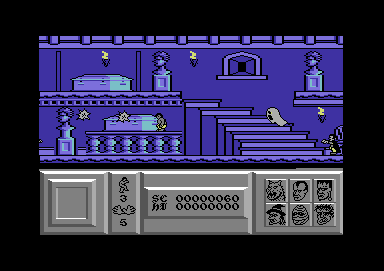

*The core of the game plays like a sort of adventure game, the downside in it being, that you gradually have to learn all of the steps you need to take in the game, what choices to make, when to take these steps etc. However I will say that all of these 'minigames' are underwhelming seperately. Reunion is a game that combines several genres of games into one. You can even see that in shops like id software, when they just turned Quake 1 into a generic space shooter, instead of the more interesting fantasy action/adventure game Romero had in mind.

At this point they didn't have a separate "day job" any longer, so they just couldn't afford to take as much creative freedom as in the 80's. And they couldn't afford to try many different projects and not make enough sales. Later on the hardware got more complicated and capable, which means they needed more people and more time and a bigger budget. So it was less expensive to take risks and explore lots of different things. It the machines were simpler, a single dude working alone could make a decent game in a matter of a month or two. Well in the 80's, microcomputer gaming was a new frontier, so yeah a lot of original stuff was made (even if a lot of clones were made too).
Creepy abandonware games code#
The idea being that if crackers removed the first check, there would be others and so if they wanted to remove all of them, they'd have to go through the entire code of the game. Instead, the game would check for a bad sector on boot up and then perform random other checks as you played. The IBM version of Pirates! did not have quite this extensive level of protection because >3043109.

Because among other things, breaking RapidLok required completely removing all disk access code and replacing it with standard CBM DOS calls. The C64 version of this was known as RapidLok and was tough enough that only the elite cracking groups like EagleSoft could break it. Pirates! for example had, on the Apple II, Commodore 64, and Amiga, a particularly horrible scheme involving a nonstandard disk format, custom DOS, and sync checks. Games had both disk protection and doc checks. Microprose were literally some of the worst for copy protection. The "focus" is gone, in part because the work to get the game running is gone. Nowadays people just hit the shortcut, play windowed, watch their browser on the side, got some music running, etc. Back in the days you'd sit down for a lengthy session and get deep into the game. Some people argue, and I won't completely disagree with them, that all this upfront work had an effect on how a game is experienced. That "pain" you and >3042885 mention is not unlike the inability to track-seek a music casette, or needing to sit the needle just right on a vinyl. Like a memory card? If your system could save at all, that is. >need a specially formatted save disk sometimes

Well stored floppies still work fine today. That's not pain, that's simply taking care of your stuff. >accidentally set the game disk on a stereo speaker and pffffffftttttttt.Ībout as bad as leaving a disc lie around with the data side up. >evil as hell copy protections that could fuck your disk drive up Grab a drink, re-read your game notes, plenty things to do. If a game did have excessive initial loading times (they kept in-between loading times in check usually), nobody forced you to stare at the screen during that time. At the end of the floppy lifecycle the drives were quite speedy. Modern discs might be faster, but the amount of data required during loading changed.


 0 kommentar(er)
0 kommentar(er)
